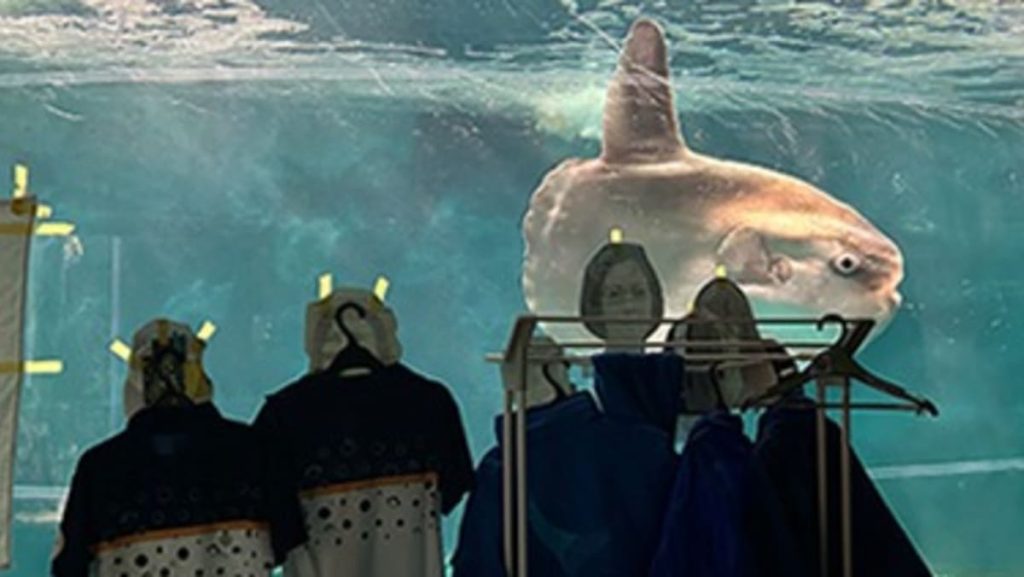The story of Mambo the sunfish at the Kaikyokan aquarium in Shimonoseki, Japan, offers a compelling glimpse into the potential emotional lives of fish and raises intriguing questions about their sensitivity to social interaction. Mambo’s sudden decline in health following the aquarium’s closure for renovations baffled staff, who initially suspected physical ailments like parasites or digestive issues. The sunfish had stopped eating its usual diet of jellyfish and exhibited unusual behavior, rubbing against the tank walls. Various treatments proved ineffective, leading staff to consider a less conventional diagnosis: loneliness.
The idea that a fish could experience loneliness might seem anthropomorphic, yet Mambo’s response to the aquarium staff’s intervention lends credence to this possibility. In a seemingly desperate attempt to alleviate the sunfish’s distress, employees decorated the tank with images of human faces, aquarium uniforms, and even clothes hangers. While skeptical, they hoped these visual reminders of human presence might provide some comfort. Remarkably, Mambo’s health improved almost immediately. This dramatic turnaround suggests that the absence of visitors, the constant flow of faces and activity outside the tank, had indeed negatively impacted Mambo’s well-being. The fish, accustomed to the stimulation of a human audience, seemed to have experienced a form of social deprivation.
The aquarium staff’s observations further support the theory that Mambo’s health was linked to social interaction. Prior to the closure, Mambo had been an active and engaging presence in the tank, frequently approaching the front glass when visitors were present. This behavior indicates a degree of awareness and perhaps even enjoyment of the human presence, a stark contrast to the listlessness exhibited after the aquarium closed. The subsequent improvement in Mambo’s health coincided with increased interaction from staff members, who made efforts to wave and engage with the fish. This suggests that even limited social contact provided a significant benefit to Mambo’s well-being.
Mambo’s story highlights the potential complexity of fish sentience and challenges conventional assumptions about their emotional capacity. While further research is needed to fully understand the social and emotional needs of fish, this case suggests that they may be more sensitive to their environment and social surroundings than previously believed. Mambo’s apparent loneliness and subsequent recovery raise important questions about the welfare of captive animals, particularly those accustomed to human interaction. The incident underscores the need for aquariums and other animal care facilities to consider the social and emotional well-being of their inhabitants, alongside their physical health.
The ocean sunfish, also known as mola mola, is a fascinating creature with unique characteristics. These gentle giants, known for their unusual shape and large size, can reach impressive dimensions, growing up to 335cm long and weighing up to 2.5 tons. Despite their imposing size, they are harmless to humans and primarily feed on jellyfish, supplementing their diet with small fish and algae. Mambo, who arrived at the Kaikyokan aquarium in February 2024, was a relatively young specimen at 79.5cm long and weighing about 28kg, demonstrating the significant growth potential of these remarkable fish. Their lifespan in captivity can extend up to 10 years, offering extended opportunities for observation and study. Unfortunately, the ocean sunfish is currently listed as vulnerable on the IUCN Red List of Threatened Species, highlighting the importance of conservation efforts to protect these unique inhabitants of our oceans.
Mambo’s story serves as a poignant reminder that even creatures seemingly distant from us on the evolutionary tree may possess complex emotional lives. His experience underscores the interconnectedness of life and the importance of considering the well-being of all living creatures, regardless of their perceived intelligence or social complexity. The incident at the Kaikyokan aquarium provides valuable insight into the potential for emotional sensitivity in fish and offers a compelling case for further research into the cognitive and emotional capacities of these often-overlooked inhabitants of our planet’s waters. As we continue to learn more about the intricate lives of animals, stories like Mambo’s challenge us to rethink our assumptions about animal sentience and to prioritize their well-being in our interactions with them.










